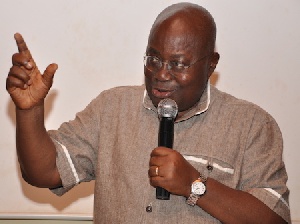Nana Addo Dankwa Akufo-Addo has described President John Mahama’s government as the most incompetent of the governments of Ghana’s Fourth Republic.
According to the 2016 presidential candidate of the New Patriotic Party, ever since the ruling National Democratic Congress government assumed the helm of affairs some seven years ago, every sector of the Ghanaian economy has been in decline, evident in worsening living standards of the Ghanaian, widespread and rampant corruption, rising levels of unemployment, declining agriculture, and enterprise failures, amongst others.
These developments, Akufo-Addo said, require that the NPP works hard to effect the change that the Ghanaian people are desirous of in 2016, stressing that an NPP victory in 2016 is the only way the nation can be returned onto the path of progress and prosperity.
Addressing party faithful on the 2nd day of his “Rise and Build Tour” of the Ashanti region on Friday, the NPP flagbearer minced no words when he said that “the most incompetent government in the history of the 4th Republic is the government of John Dramani Mahama. We have a responsibility in the NPP to work hard and remove this government.”
Citing the declining nature of Ghanaian agriculture as one example, Nana Akufo-Addo quoted from a Ghanaian Times report of Thursday, October 8, which was attributed to Brig. Gen. Nunoo Mensah. The head of Human Security at the National Security Secretariat and former National Security Advisor to the late President Mills is reported to have described the rapidly decreasing agricultural production in the country as a looming danger.
“Despite the availability of millions of hectares of arable land in our country, Ghanaian farmers are unable to produce. This is all because of bad governance. Every year, according to the Minority Spokesperson on Agriculture, government support for agriculture declines. Why then won’t we have this problem of food shortage?” he asked.
On the implementation of the National Health Insurance Scheme, the first of its kind in Africa, by President Kufuor to replace the inhumane “cash-and-carry” system and afford the poor and vulnerable in society access to quality healthcare, Nana Akufo-Addo lamented that Ghana, under President Mahama, is now back to the “cash and carry” system.
This, he said, was because funds for the NHIS, like all statutory payments, are in arrears. As a result, healthcare providers are no longer willing to provide healthcare to NHIS card holders, leaving Ghanaians to pay for healthcare services.
Despite schools reopening some weeks ago, the NPP flagbearer stated that classrooms across the country are half-empty because parents cannot afford to pay the fees of their wards under the current economic conditions.
An NPP victory in 2016, Akufo-Addo noted, will bring back hope to Ghanaians and will begin the process of rebuilding Ghana again, adding that “the change we are looking for in our lives will then come.”
His government, from January 2017, he assured, will put in place policies and a conducive environment to enable the private sector thrive, which will in turn create the hundreds of thousands of jobs needed by Ghana’s teeming masses of unemployed youth.
The total export value of Ghanaian agriculture which stands at $2 billion, in comparison with the $12 billion export value of Ivorian agriculture, according to Akufo-Addo, is an indictment on the Mahama government.
Whereas Ghana depends largely on the export of cocoa, Cote d’Ivoire, he said, has diversified its agricultural exports, adding coffee, cashew nuts, cotton and oil palm to its cocoa exports.
“We are going to change all those statistics and empower our agricultural sector. We also produce cashew nuts, cotton, oil palm, amongst others, in Ghana. We will give producers of these crops the same support that cocoa has received over the years, so we can increase agricultural productivity and thereby raise export revenues for the development of Ghana,” he added.
To the regional and constituency executives, as well as parliamentary candidates gathered from 15 constituencies in the Ashanti Region, Nana Akufo-Addo reaffirmed his target of achieving 80% margin of victory for the NPP in the popular vote in the 2016 election. The constituencies were Atwima Mponua, Atwima Nwabiagya North, Atwima Nwabiagya South, Atwima Kwanwoma, Ahafo Ano South East, Ahafo Ano South West, Ahafo Ano North, Fomena, Obuasi East, Obuasi West, Bekwai, Akrofuom, Odotobri, Manso Edubia and Manso Nkwanta.
He appealed to the newly elected parliamentary candidates from these constituencies to take the lead in bringing on board their fellow aspirants who were not successful in the parliamentary primaries and their constituency executives, as co-operation amongst members of the party is the first key to realising the 80% target.
General News of Saturday, 10 October 2015
Source: starrfmonline.com

















